[vc_row][vc_column][vc_single_image image=”949″ img_size=”full” alignment=”center”][vc_custom_heading text=”“A Piece of My Mind”” font_container=”tag:h1|font_size:50px|text_align:center|color:%232633ef” google_fonts=”font_family:Bitter%3Aregular%2Citalic%2C700|font_style:700%20bold%20regular%3A700%3Anormal”][vc_custom_heading text=”November 2020 Newsletter” font_container=”tag:h1|font_size:30px|text_align:center|color:%232633ef” google_fonts=”font_family:Bitter%3Aregular%2Citalic%2C700″][/vc_column][/vc_row][vc_row][vc_column width=”2/3″][vc_column_text]
Advancing Christian Faith and Values,
Defending Religious Liberty for All,
Supporting Civility and the Common Good
through Preaching, Teaching, Writing, Activism and Reasoned Conversations
www.donaldshoemakerministries.com[/vc_column_text][/vc_column][vc_column width=”1/3″][vc_single_image image=”1304″ img_size=”full” alignment=”center”][/vc_column][/vc_row][vc_row css=”.vc_custom_1598373738095{border-radius: 3px !important;}”][vc_column][vc_column_text]
Thanksgiving 2020
The Sacrament of Sacred Song
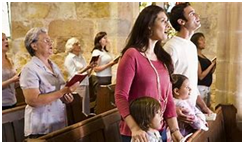 “…singing psalms and hymns and spiritual songs, with thankfulness in your hearts to God.” – Colossians 3:16 ESV
“…singing psalms and hymns and spiritual songs, with thankfulness in your hearts to God.” – Colossians 3:16 ESV
“There is something mysteriously fortifying about the act of singing together. Oral and chest cavities vibrating in rhythmic unison—which is all corporate singing is—create a peculiar companionship 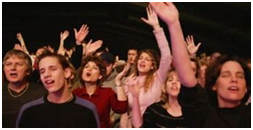 among people who, apart from their creed, may have little else in common.”
among people who, apart from their creed, may have little else in common.”
– Barton Swaim, “O for a Thousand Tongues to Sing,” The Wall Street Journal, July 3, 2020
[/vc_column_text][/vc_column][/vc_row][vc_row css=”.vc_custom_1598373738095{border-radius: 3px !important;}”][vc_column][vc_column_text]
An Ultimate Truth for Today’s Political Storm…
“The Most High is sovereign over the kingdoms of men and gives them to anyone he wishes.” – Daniel 4:25 (see Acts 17:24-28;
2 Kings 19:14-15)
Jesus to the Roman Governor Pontius Pilate: “You have no power over me except what is given from above.” – John 19:11
“God, no matter how much human affairs are in confusion and tumult,
‘Our Times are in Your Hand.’ From our vantage point, we see our country in political strife and moral disarray. From your vantage point, you are working out a beautiful tapestry—your plans for us are on track and on schedule.”
Bible Insight #1
– Lamentation during Thanksgiving (Psalm 137)
Thanksgiving 2020 finds us sometimes, perhaps often, in a state of lamentation in light of all that swirls around us. The Bible shares the lamentation of God’s people in a time of sadness and anticipates our own crises and need for lamentation.
By the waters of Babylon,
there we sat down and wept,
when we remembered Zion.
On the willows there we hung up our lyres.
For there our captors required of us songs,
and our tormentors, mirth, saying,
“Sing us one of the songs of Zion!”
How shall we sing the Lord’s song in a foreign land?
If I forget you, O Jerusalem,
let my right hand forget its skill! Let my tongue stick to the roof of my mouth,
if I do not remember you,
if I do not set Jerusalem above my highest joy!
Bible Insight #2
– Thanksgiving for Government Officials?
“I urge, then, first of all, that petitions, prayers, intercession and thanksgiving be made for all people— for kings and all those in authority, that we may live peaceful and quiet lives in all godliness and holiness. This is good, and pleases God our Savior, who wants all people to be saved and to come to a knowledge of the truth.” – 1 Timothy 2:1-4 NIV
It may seem difficult if not silly to give thanks for “all those in authority.” We may feel their office is illegitimate, or their rule is corrupt. Well, join the real world. History and the contemporary world are full of bad examples.
Yet, biblical people of God managed to “work within the system” in spite of corruption, selfishness, greed and quest for power. Daniel served in the royal court of Babylon and also in the Persian government. Joseph served the Egyptian ruler. Nehemiah was a key official under the Persian king. Roman soldiers were not told to quit their role, but rather how to behave.
The Apostle Paul had every right to have a love/hate relationship with the Roman government of his day. It protected his citizenship rights. For a time it provided a peaceful environment for the spread of the Gospel. But it also could be cruel and arbitrary with justice. Soon it would persecute the early Christians who refused to accept the theocratic demands of Rome.
Yet, Paul (and Peter) saw the Roman government as God’s instrument to secure justice and punish evil, be it ever so imperfect while it did so.
If Paul could call Christians to “prayer, intercession and giving of thanks” for rulers in the Roman system, how much easier is the obligation on us to offer petitions and thanksgiving to God for our American system—flawed to be sure, but immensely freer and more responsive than Rome would ever be.
So as we enter this very meaningful Thanksgiving Season, let’s be realistically thankful and prayerful for our president and governors, our elected legislatures, our appointed judges. If all we do is acquiesce or complain while failing to pray and give thanks, we share blame when the state goes astray.
Message of the Month – Applying Jesus’ teaching on
“Rendering to Caesar” and “Rendering to God”
“Tell us, then, what you think. Is it lawful to pay taxes to Caesar, or not?”
But Jesus, aware of their malice, said, “Why put me to the test, you hypocrites? Show me the coin for the tax.”
And they brought him a denarius. And Jesus said to them, “Whose likeness and inscription is this?” They said, “Caesar’s.” Then he said to them, “Therefore render to Caesar the things that are Caesar’s, and to God the things that are God’s.” – Matthew 22:17-21 (English Standard Version)
The immediate malicious question was whether to pay taxes to Caesar. Jesus’ critics hoped to paint him in a corner. “No” would make him seditious; “Yes” would alienate the people.
This was the kind of question that, carelessly or imperfectly answered, would fatally compromise Jesus. Jesus turned it into one of the world’s great and mature pronouncements on civil power.
 Jesus turned their possession of a “denarius” (a Roman coin common for paying a day’s labor) into the principle that what belongs to Caesar should be given to him. By possessing the coin, they are implicitly acknowledging the realm of Caesar. But Jesus went beyond this to a bombshell: Caesar’s realm is one reality; the realm of God is just as real. “Render to God what is his.”
Jesus turned their possession of a “denarius” (a Roman coin common for paying a day’s labor) into the principle that what belongs to Caesar should be given to him. By possessing the coin, they are implicitly acknowledging the realm of Caesar. But Jesus went beyond this to a bombshell: Caesar’s realm is one reality; the realm of God is just as real. “Render to God what is his.”
Jesus advocated loyal but limited responsibility to political powers. The authority to mint coins legitimized the role of government. It performs multiple services for its citizens and thus has the right to levy taxes.
But the state can exceed its authority and intrude into the realm of God’s authority or even become demonic. Christians must avoid the extremes of excessive patriotism or lax attention to Caesar.
– F. Dale Bruner, Matthew, vol. 2, page 785
On the next page I discuss more fully how we should understand these two realms—the realm of Caesar and the realm of God. Wrong understandings will exact a heavy price.[/vc_column_text][/vc_column][/vc_row][vc_row css=”.vc_custom_1598373738095{border-radius: 3px !important;}”][vc_column][vc_column_text]
The Common Misunderstanding
This notion thinks of the Rule of God and the Rule of the State as totally separate things, sovereign within their own spheres. Jesus didn’t teach this. And we certainly shouldn’t mean this when we speak of “separation of church and state.”
[/vc_column_text][/vc_column][/vc_row][vc_row css=”.vc_custom_1598373738095{border-radius: 3px !important;}”][vc_column width=”1/2″][vc_single_image image=”1466″ img_size=”full” alignment=”center”][/vc_column][vc_column width=”1/2″][vc_single_image image=”1467″ img_size=”full” alignment=”center”][/vc_column][/vc_row][vc_row css=”.vc_custom_1598373738095{border-radius: 3px !important;}”][vc_column width=”2/3″][vc_column_text]
The Secular Mindset
This mindset makes the rule of the secularist state almost all-inclusive, with a tiny area reserved for religious belief and practice (for those folks who think they need it). This area is kept more-or-less under secular control. In a totalitarian system the “red zone” is totally inside the blue. In a free society the “red zone” is mostly outside the blue.
When politicians speak of “freedom of worship” rather than “freedom of religion”, they are increasing the state’s domination of religion. Now even “freedom of worship” is inside the blue zone under coronavirus restrictions!
[/vc_column_text][/vc_column][vc_column width=”1/3″][vc_single_image image=”1468″ img_size=”full” alignment=”center”][/vc_column][/vc_row][vc_row css=”.vc_custom_1598373738095{border-radius: 3px !important;}”][vc_column width=”2/3″][vc_column_text]
The Biblical View
Biblical teaching places all human authorities and powers under the Rule of God. By its nature, God’s rule is all-inclusive. By its nature, the authority of human government is limited. God grants authority to the state to secure rights and to perform certain duties. Christians are subject to these states but must oppose the expansion of the state beyond its proper perimeters.
– 2020 Donald Shoemaker
[/vc_column_text][/vc_column][vc_column width=”1/3″][vc_single_image image=”1469″ img_size=”full” alignment=”center”][/vc_column][/vc_row][vc_row css=”.vc_custom_1598373738095{border-radius: 3px !important;}”][vc_column][vc_column_text]
A Thanksgiving Song during Suffering
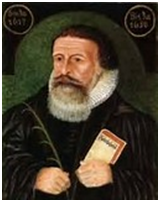 “Now Thank We All Our God”
“Now Thank We All Our God”
– Martin Rinkart (1586-1649)
Rinkart’s powerful hymn fits today’s pandemic and other uncertainties.
Martin Rinkart was a Lutheran clergyman and hymn writer. He served in the city of Eilenburg during the terrible Thirty Years’ War (1618-48) and the plague of 1637. The Thirty Years’ war was destructive and deadly throughout Central Europe. It resulted in eight million casualties.
The war started as a conflict between Protestant and Catholic states in the Holy Roman Empire when the new emperor, Ferdinand II, attempted to impose religious uniformity (Roman Catholicism) throughout the empire, including in the Protestant states. The war morphed into a conflict having less to do with religion and more to do with rivalry over who would be the dominant power in Europe.
It’s hard for Americans to grasp the church-state connectedness that would generate religious wars. When my wife and I were in Europe in 2014 we were amazed by the knight armor displayed in sanctuaries. Europe for centuries had this connectedness. Bear in mind that Ottoman armies conquered Constantinople in 1453 AD and were besieging the city of Vienna in 1529, while the Reformation was getting under way. These sieges were in a real sense conflicts between Muslims and Christians.
Rinkart wrote his magisterial thanksgiving hymn “Now Thank We All Our God” around 1636 during the heat of war. He eventually was the only clergyman alive and remaining in Eilenburg to minister to people in their suffering and hunger, sometimes performing multiple funerals in a single day.
“Shall we accept good from God, and not trouble?” asked the biblical patriarch Job in the midst of his many afflictions (Job 2:10). I think the faith of Job and of Martin Rinkart to be greater than my own when I read the latter’s encouraging call to Thanksgiving prayer:
Now thank we all our God, with heart and hands and voices,
Who wondrous things has done, in Whom this world rejoices;
Who from our mothers’ arms has blessed us on our way
With countless gifts of love, and still is ours today.
O may this bounteous God through all our life be near us,
With ever joyful hearts and blessed peace to cheer us;
And keep us in His grace, and guide us when perplexed;
And free us from all ills, in this world and the next!
All praise and thanks to God the Father now be given,
the Son and Spirit blest, who reign in highest heaven
the one eternal God, whom heaven and earth adore;
for thus it was, is now, and shall be evermore.
Words by Martin Rinkart (c.1636)
Melody by Johann Cruger (1647)
Harmony by Felix Mendelsohn (1840)
Translation into English by Catherine Winkworth (1856)
 PEARLS BEFORE SWINE © 2020 Stephan Pastis. Reprinted by permission of
PEARLS BEFORE SWINE © 2020 Stephan Pastis. Reprinted by permission of
ANDREWS MCMEEL SYNDICATION. All rights reserved.[/vc_column_text][/vc_column][/vc_row][vc_row][vc_column][vc_column_text]
Religious Liberty Vigilance –
May Nominees for Government Positions
Be Disqualified over Their Religious Beliefs?
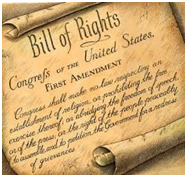 The Senators and Representatives before mentioned, and the Members of the several State Legislatures, and all executive and judicial Officers, both of the United States and of the several States, shall be bound by Oath or Affirmation, to support this Constitution; but no religious Test shall ever be required as a Qualification to any Office or public Trust under the United States.
The Senators and Representatives before mentioned, and the Members of the several State Legislatures, and all executive and judicial Officers, both of the United States and of the several States, shall be bound by Oath or Affirmation, to support this Constitution; but no religious Test shall ever be required as a Qualification to any Office or public Trust under the United States.
– Article 6, Section 2 of the Constitution of the United States
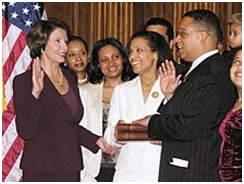 Keith Ellison of Minnesota, a Muslim, was elected to the House of Representatives on November 7, 2006, and sworn in on January 4, 2007. In a private replay of the official swearing-in on the House floor, he took his oath of office with his hand on the Qur’an. It was an English translation that once belonged to Thomas Jefferson and came from the Library of Congress.
Keith Ellison of Minnesota, a Muslim, was elected to the House of Representatives on November 7, 2006, and sworn in on January 4, 2007. In a private replay of the official swearing-in on the House floor, he took his oath of office with his hand on the Qur’an. It was an English translation that once belonged to Thomas Jefferson and came from the Library of Congress.
His action brought a ton of criticism. Whatever the criticism, the important thing to remember is that Congressman Ellison was well within his Constitutional rights to do this. Neither his faith nor this action could make him unfit for office according to Article 6, Section 2 of the Constitution.
Fast-forward to 2017. Russell Vought was President Donald Trump’s pick for deputy director of the Office of Management and Budget.
Senator Bernie Sanders repeatedly challenged Vought’s religious beliefs (on the afterlife!) and therefore his qualification to serve in public office.
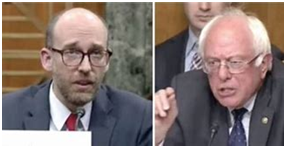 “This nominee is really not someone who is what this country is supposed to be about,” said the senator. “I will vote no.”
“This nominee is really not someone who is what this country is supposed to be about,” said the senator. “I will vote no.”
Sanders notwithstanding, the Constitution says no religious test for office.
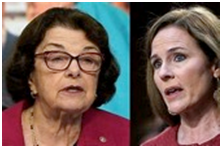 Fast-forward once again to December 2017, and Amy Coney Barrett is being questioned in the Senate Judiciary Committee for an appointment to the 7th Circuit Court of Appeals. Senator Diane Feinstein (D-CA) said,
Fast-forward once again to December 2017, and Amy Coney Barrett is being questioned in the Senate Judiciary Committee for an appointment to the 7th Circuit Court of Appeals. Senator Diane Feinstein (D-CA) said,
Why is it that so many of us on this side have this very uncomfortable feeling that dogma and law are two different things, and I think whatever a religion is, it has its own dogma. The law is totally different. And I think in your case, professor, when you read your speeches, the conclusion one draws is that the dogma lives loudly within you. And that’s of concern.
Barrett assured the committee that her faith would not influence her jurisprudence. Now that she has been confirmed for the Supreme Court and sworn in, she is the sixth Roman Catholic* on the Supreme Court—they may share a common faith but hardly a common philosophy of jurisprudence!
“Without regard to one’s faith or political philosophy”—that’s how the judicial branch of government should operate, unlike the legislative and executive branches, where members of each may bring their philosophies of life to the table—even those philosophies that are faith-based.
But once again, the Constitution forbids any religious test for office. This protection may become even more important in years to come if leftism and other secularisms become more dominant in American life.
* Other Roman Catholics on the U.S. Supreme Court: John Roberts, Sonia Sotomayor, Samuel Alito, Clarence Thomas and Brett Kavanaugh[/vc_column_text][/vc_column][/vc_row][vc_row][vc_column][vc_column_text]
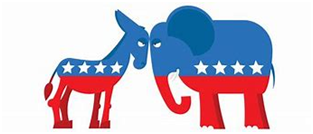 Political Shibboleths that
Political Shibboleths that
Mean Absolutely Nothing
“Progressives”
• I just don’t get this one! All sides use it to describe those who advocate increased government involvement in most aspects of life. The word today describes leftists. The mystery is why non-leftists would use the word “Progressives” to describe those they feel are fundamentally on the wrong track.
• “Progressive” is a positive word. Its opposite is “regressive. “ No opponent of so-called “progressives” wants to be thought of as regressive.
• The government’s involvement may be regressive rather than progressive, if the particular activism is unwise or unjust—like curtailing religious liberty.
“We’re on the right side of History” or “They’re on the wrong side of History.”
• From the human side, who knows the course of history?
• God knows the course of history—the full integration of his Kingdom in the world. But most who speak about “the right side of history” certainly don’t mean this.
• The phrases reflect political agenda more than any kind of historical progress.
“We expect them to pay their fair share.”
• Please quantify “fair share.” Actually “fair share” is a notion in motion and appears to be like helium—always rising like California’s steep graduated income tax.
• Notice the phrase is always used in the third person (“their fair share”), never in the first person (“my fair share” or “our fair share”) or second person (“your fair share”). Thus, the statement serves to divide and polarize.
“We don’t want to turn back the clock.”
• Why not? The past wasn’t the wrong path if it was the better path.
• It would depend on the issue. No turning back to “Jim Crow” laws. But immigration law and policy may have (at least at times) been better then than now.
• I suspect many living in Turkey today under President Recep Erdogan, or in Russia under Vladimir Putin, or in other countries that have regressed from hopes for democracy they had just a few years ago wouldn’t mind “turning back the clock.”
“The American People want…think…expect…”
• Euphemism for what the candidates and their supporters want, think, or expect.
• “The American People” is too broad and diverse to want and think alike, except for some very basics like being safe (but they may disagree on how best to achieve it).
“I will be the candidate for ALL the people.”
• No you won’t! If supporters win, opponents lose on many issues important to them.
• Once elected, candidates will listen to their own side primarily.[/vc_column_text][vc_row_inner][vc_column_inner][vc_column_text]
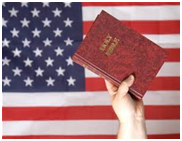 Replay: Looking back to the 2016 campaign
Replay: Looking back to the 2016 campaign
Quiz Time! – Match the Candidate to the Comment
#1 – “Two Corinthians 3:17, that’s the whole ballgame. ‘Where the Spirit of the Lord is, right? Where the spirit of the Lord is, there is liberty.’”
#2 – “Until [Jesus] comes again, . . . President-to-be [name], we decree and declare from the crown of your head to the soles of your feet that the favor of the Lord will surround you like a shield, in Jesus’ name.”
#3 – “Without vision, the people will perish.”
#4 – “For people of faith, who care about religious liberty, life and marriage, it’s time for us to rally around [name].”
#5 – “…we move into the more disturbing category of Republicans we might charitably diagnose as ‘faith-deranged’ – in other words, as likely to do fine among the unwashed ‘crazies’ in the red-state primaries, but whose religious beliefs would (or should) render them unfit for civilized company anywhere else. Among the faith-deranged, [name] stands out.”
#6 – How many of the above accounts violate the “separation of church and state”? (a) all of them, (b) #2, (c) #4, (d) none of them
Answers
#1 – Candidate DONALD TRUMP speaking at Liberty University, quoting 2 Corinthians 3:17 wildly out of context.
#2 – Candidate HILLARY CLINTON receiving a blessing (practically an anointing) from 100 clergy in South Carolina.
#3 – Candidate BERNIE SANDERS speaking at a prayer breakfast before the South Carolina primary (and giving Proverbs 29:18 a totally wrong twist).
#4 – Dr. James Dobson, endorsing candidate TED CRUZ via robocalls paid for by Courageous Conservatives PAC.
#5 – Rant in Salon against “God-fearing clowns and faith-mongering nitwits groveling before Evangelicals” that levels an attack on candidate MARCO RUBIO.
#6 – Correct answer: (d) none of them, although #2 would come close if these clergy speak of their candidate this way in front of their congregations.
Contact me at: donaldshoemakerministries@verizon.net
www.donaldshoemakerministries.com
[/vc_column_text][/vc_column_inner][/vc_row_inner][/vc_column][/vc_row][vc_row][vc_column][vc_column_text]Appendix: Religious Liberty during a pandemic
Excerpts from Denver Bible Church v. Azar,
U.S. DISTRICT COURT FOR THE DISTRICT OF COLORADO (October 15, 2020)
Source: The Volokh Conspiracy, October 20, 2020. Underlining mine.
For more information, read the actual court decision or The Volokh Conspiracy.
Quick Summary: Houses of worship, which the Colorado order labels “critical” institutions, must be treated at least as well as other critical institutions.
The State rightly argues that during a public-health emergency, courts must be particularly mindful of the complex interaction between constantly evolving scientific understanding and policymaking, and the court recognizes that the decisions being made by the State Defendants here are truly matters of life and death…
But the existence of an emergency, even one as serious as this one, does not mean that the courts have no role to play, or that the Constitution is any less important or enforceable. And while the religious, like the irreligious or agnostic, must comply with neutral, generally applicable restrictions, the First Amendment does not allow government officials, whether in the executive or judicial branch, to treat religious worship as any less critical or essential than other human endeavors. Nor does it allow the government to determine what is a necessary part of a house of worship’s religious exercise…
In the earliest days of a pandemic or other true emergency, what may be the least restrictive or invasive means of furthering a state’s compelling interest in public health will be particularly uncertain, and thus judicial intervention should be rare. But as time passes, scientific uncertainty may decrease, and officials’ ability to tailor their restrictions more carefully will increase. What may have been permissible at one point given exigencies and realistic alternatives in the face of those exigencies may not remain permissible in the long term…
While the order designates houses of worship as “critical,” in practice it treats them differently from other “critical” businesses and activities, even those that pose a comparable risk of COVID-19 transmission. Plaintiffs highlight two restrictions in the order that, they contend, are unconstitutionally applied to houses of worship and burden their right to free exercise: occupancy caps for indoor worship services, and the requirement that worshippers wear a face mask for indoor services….
Public Health Order 20-35 creates exemptions for a wide swath of secular institutions deemed “critical,” …your local Home Depot, Walmart, King Soopers, and marijuana shop are not under any additional occupancy limitation other than the six-foot distancing requirement. Denver Bible Church and Community Baptist Church, by contrast, must comply with numerical occupancy caps, no matter how many people their sanctuaries might accommodate while maintaining six feet of distance between non-household members….
The State may have the power in general to decide what activities are and are not critical to ensure the health and safety of individuals and their households, and what tasks are necessary to carry out secular activities. But it does not have the power to decide what tasks are a necessary part of an individual’s religious worship. And while religious exercise is subject to truly neutral and generally applicable regulations, once the State begins creating exceptions for secular activities as it deems necessary, then it is obligated to treat religious activities no less favorably, absent a compelling reason….
The more serious problem is that Public Health Order 20-35 exempts secular settings that pose similar threats of prolonged exposure from the occupancy limitations and face-mask requirements imposed on houses of worship. What is the meaningful difference between, say, a warehouse, a restaurant, or an elementary school—where employees, diners, and students spend long periods in a closed-indoor setting—and a house of worship?
The best answer Colorado has is that “singing or speaking loudly propels respiratory droplets farther,” and that this kind of activity happens in houses of worship but not in those other settings. Dr. Herlihy likewise generalizes that “customs in houses of worship may also result in increased contact. For example, shaking hands, observing Eucharist, passing a basket, or showing a sign of the peace may all place people in closer contact th[a]n they would be in other settings.”
Perhaps. But shaking hands, passing items around, and showing a sign of peace have secular equivalents in many places of business or social settings. And as Dr. Herlihy admits, schools “also frequently have singing or loud, excited speaking.” Indeed, most outbreaks in Colorado have occurred at workplaces, schools, and businesses, not churches…
In the end, though, the court does not doubt the science underlying Colorado’s decisions. It accepts that the best available evidence says transmission of COVID-19 is more likely indoors when people are together for long periods of time.
But the orders reveal that in practice the State treats some activities as necessary, but those Plaintiffs seek to engage in as less so. This reflects the view that, as one court put it, it is practically impossible to restrict people from working together in person in places like schools, food-processing facilities, restaurants, and warehouses, but “churches can feed the spirit in other ways.” That may be true for many religious individuals and institutions, but it is not for Plaintiffs. And with due respect for both the State and the Seventh Circuit, this court does not believe government officials in any branch have the power to tell churches and congregants what is necessary to feed their spiritual needs…
Plaintiffs are likely to succeed on the merits of their free exercise claim for a simple reason. Having decided that the risk of allowing various activities to be exempt from the strictest Safer at Home rules is justified on the basis that those activities are critical and necessary, the State cannot decide for Plaintiffs what is critical and necessary to their religious exercise. With each exception Colorado makes for secular institutions, the failure to make the same exemption for houses of worship becomes increasingly problematic…
…Colorado’s failure to offer a compelling reason why houses of worship are subject to greater restrictions than warehouses, schools, and restaurants violates the First Amendment’s guarantee of the free exercise of religion…
All in all, based on their bona fide religious need to do so, Plaintiffs will be allowed to open their sanctuaries subject to the same capacity, social distancing, and masking rules that are applicable to other critical businesses, and will be able to permit congregants to remove their masks if and when it is necessary to carry out their religious exercise…[/vc_column_text][/vc_column][/vc_row]

